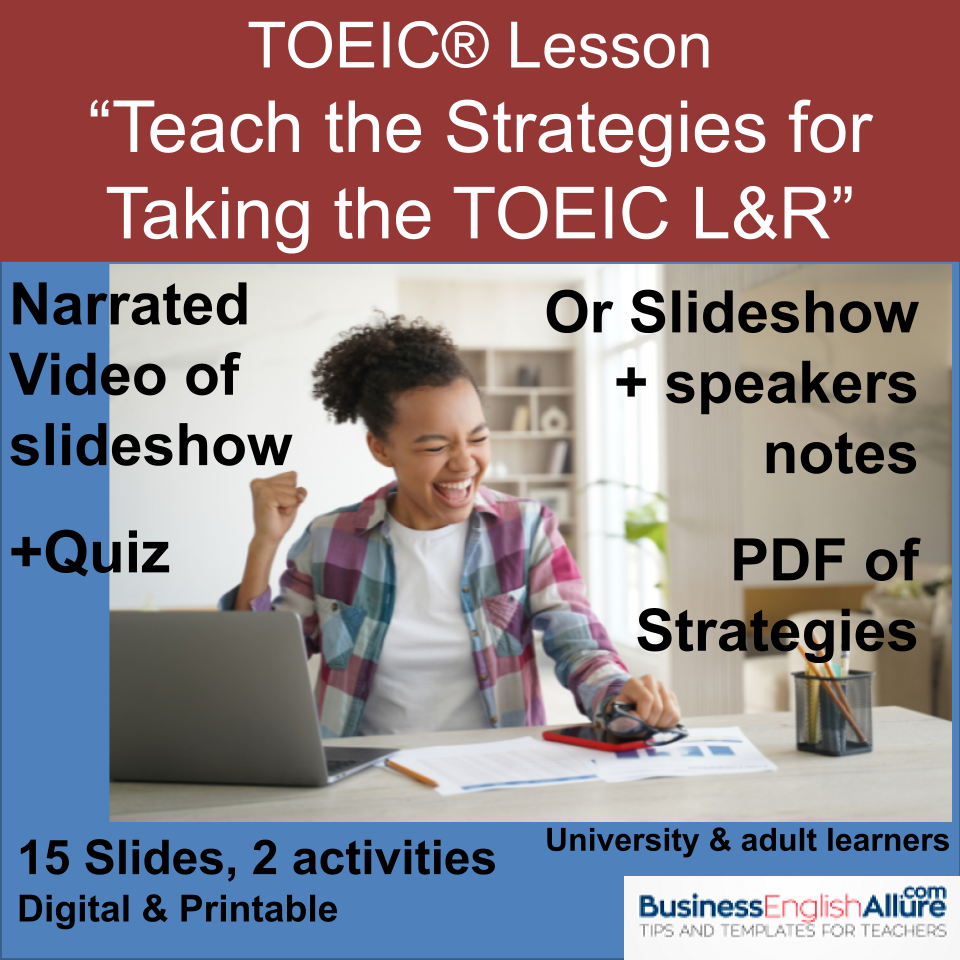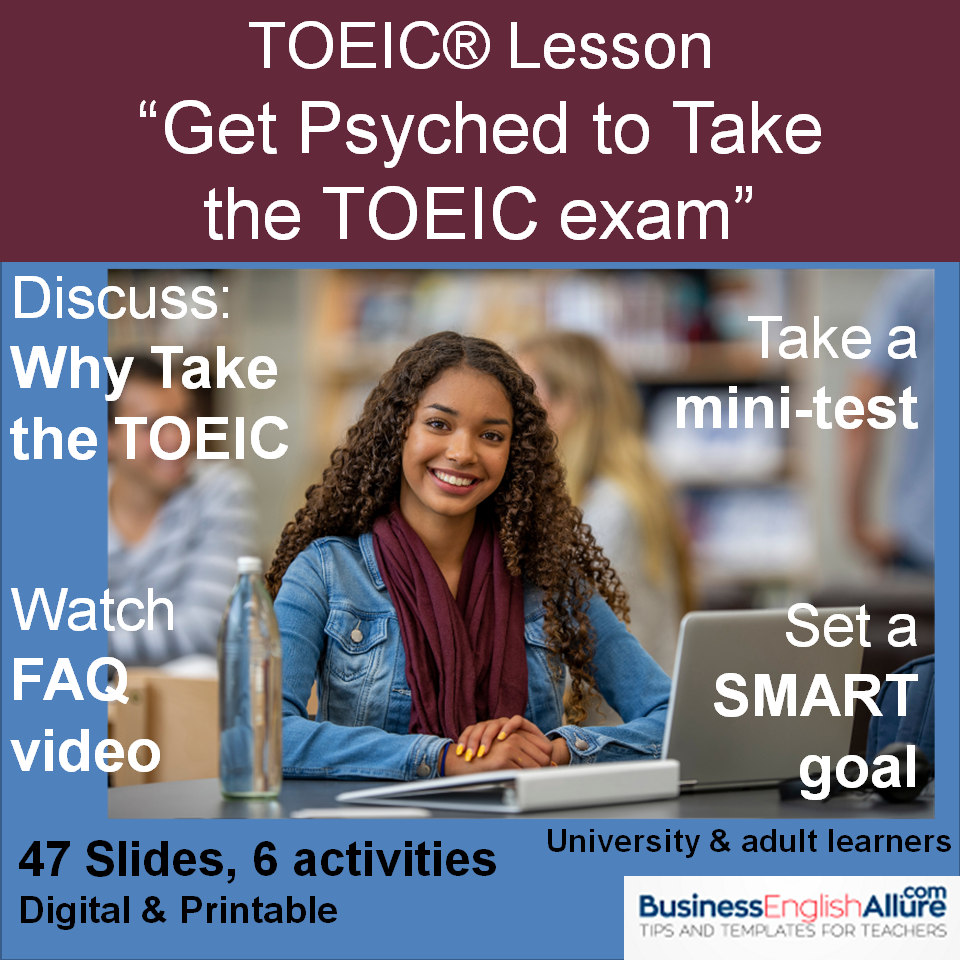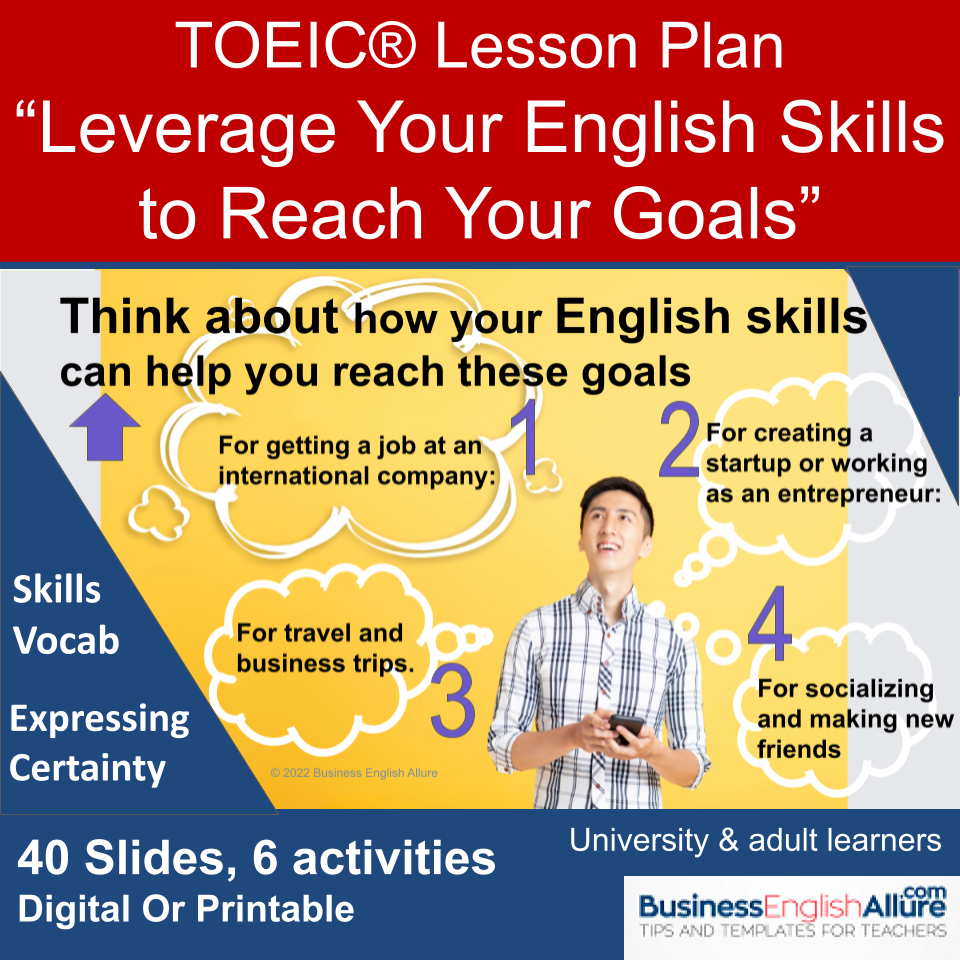TOEIC Lesson Plan: Discussing Goals and Success

Give your ESL students the vocabulary to discuss their life goals and what success looks like to them. Brainstorm the difference in meaning between goals and success. The aim of this lesson is to start students thinking about setting goals in English or in TOEIC exam preparation.
Start off by brainstorming the synonyms for a goal based on this definition. A goal is the result or achievement toward which effort is directed; aim, end, target, purpose, or intent.
Brainstorm for the word success according to this definition. Success is the favorable or prosperous termination of attempts or endeavors; the accomplishment of one’s goals, the attainment of wealth, position, honors, achievement, accomplishment, or triumph.
For me, a goal is a very well-defined end result at which I’m directing my attention and energy. Whereas success implies I’ve done it. I’ve attained my goals.
Part I: Ask students to name their life goals then collect and compare results
When asked, “what are your goals in life?” most people will choose one of these three main categories of goals: money, fame, or happiness. Write these three categories of goals on the whiteboard. Project the image below as you read off the examples of goals for each category.

Money? Is your goal to educate yourself for the best job available? Or to start your own company and become a millionaire so you can buy anything you want?
Is fame your goal? To be a gold medalist in your favorite sport, or to write a best-selling book, or maybe to become a famous actor or musician?
How about happiness? Is that your goal? To have a good relationship and form a family? Would being healthy and fit make you happy? Or is traveling the world the secret to your happiness?
Now collect students’ responses on the whiteboard or simply ask for a show of hands. Discuss findings.
Part 2: Vocabulary to discuss goals and success
Here are some verbs I picked out for you to use in class. The most commonly used ones are in bold. Some verbs are used with both goals and success.
When we decide on a goal, when we think about it or dream about it, when we imagine ourselves doing/being/having it: We set a goal, establish a goal, formulate a goal, and clarify a goal. (To explain our goals we’d probably use the future like “going to” or “will” or “I plan to” or “I see myself doing”, “I intend to”, “I’m thinking about doing”, “I’m thinking of doing”).
Use these verbs to talk about the journey to our goal, we are working on it: We pursue our goals, strive for a goal, work towards a goal, strive to meet our goals, and strive to reach our goals. (We’d probably use present continuous.)
To talk about completing a goal, when we’ve got it: we have met our goals, reached our goals, achieved our goals, attained our goals, obtained our goals, and exceeded our goals. (We’d probably use present perfect tense here or past simple with a date.)
Success Vocabulary: Talking about the wonderful moment: I am seeing success, he is celebrating (experiencing, enjoying) success, he is pursuing success, he is striving for success. Talking about someone who has made it: I have achieved success in my life, I have obtained success, He has attained success. Adjectives to describe success: remarkable success, extraordinary, huge, considerable, significant, OR partial, modest, or mixed success. Success is a noun, successful is the adjective, and to succeed is the verb.
Kinds of goals and success: Financial goals (or success), short-term goals, long-term goals, educational goals, career goals (professional success), fitness goals, spiritual or religious goals, and personal goals.
Give students a little more time for practice by watching one or both of these videos. Just click on the image to preview the videos I found on YouTube.
Part 3: Watch these two videos with expressions for talking about your goals and success

Now we’re ready for a discussion. Form pairs or small groups with a leader to take notes.
Part 4: Discussion questions or writing prompts
How important is it to you to have goals?
Is having a goal in life effective in becoming successful?
Does having a goal help to motivate you?
Do you have any goals you feel are unrealistic?
What are your goals in your current job?
Do you have a five-year plan for your life?
What are some of the goals you have already achieved?
How would you feel if you failed to achieve your goals?
Who is successful in your family? Why?
Can you think of a successful person from your country? How did they do it?
Do you think it’s a good idea to write your goals down and tick them off as you achieve them?
EXTRA RESOURCES:
I love BusinessEnglishpod.com and have used this website for years and writing SMART Goals is still a hot topic. The podcast narrator asks vocabulary questions at the end, and students will chime in quickly with their answers before the correct answer is revealed. The listening is free. The link I’ve given you has the transcript. You could do a gap-filling listening exercise with the transcript.
Listening: Achieving your Goals Part 1 Setting SMART Goals from Business English Podcast includes transcript //www.mybeonline.com/business-skills-360-achieving-your-goals-part-1/
Listening: Achieving your goals Part 2 Visualization and Reward from Business English Podcast includes transcript //www.mybeonline.com/business-skills-360-achieving-your-goals-part-2/
Article for students: What’s the difference between achieving goals and being successful? Rusty Holmes is a fitness guru who learned the hard way that achieving goals and being successful are not the same. Your students will enjoy reading it because he has built an online presence and has achieved some fame with his brand. A common goal for many adults, young and old alike //www.rustyholmes.com/lets-talk-about-it/2018/1/4/the-difference-between-achieving-goals-and-being-successful
Article for you: SMART Goal Setting for Language Learners This article will explain SMART goals and their direct application to language learning. Love it. //elt-connect.com/goal-setting/?unapproved=505&moderation-hash=227300472b904f60d363311c50147c82#comment-505.
Need another lesson plan? Try this one where you will find a list of 80 words you’ll need for this lesson on one of the top TOEIC topics “Kinds of Jobs and Kinds of businesses” including five suggestions for making your own vocabulary games that are proven (by me) to engage students and increase retention of new words. To round out the lesson on jobs find three extra speaking and writing activities. The total class time needed should be around three hours.: /toeic-lesson-plan-jobs-and-businesses/.
Leave a comment and signup for more useful stuff
I hope you will use this post in your business English classes as well as your TOEIC preparation classes. Leave a comment if you liked this post. Signup for the newsletter if you want to receive more posts.

I’ve got a store on TeachersPayTeachers.com
No time to prepare? Buy this ready-made TOEIC lesson plan on Success & Goals for just $3. Digital & printable versions.












Thanks for sharing.
Thank you Helen.
I agree!
Thanks for the commen Ben!
Hello, Thanks for sharing this blog. I appreciate your efforts; this blog is very helpful for me. If you want any help regarding the Business English in Switzerland, then contact with AHAD. Visit our website://md-businessenglish.com/
Hi Marcus, Thanks so much for commenting. I clicked through to your website and found that your message and offering are very clear. Love the testimonials. I then clicked on your LinkedIn button and went to your profile. I think you’ve done an excellent job in developing your online presence and brand. I’ve asked that we connect. Good luck! Ellen Baker Dubois